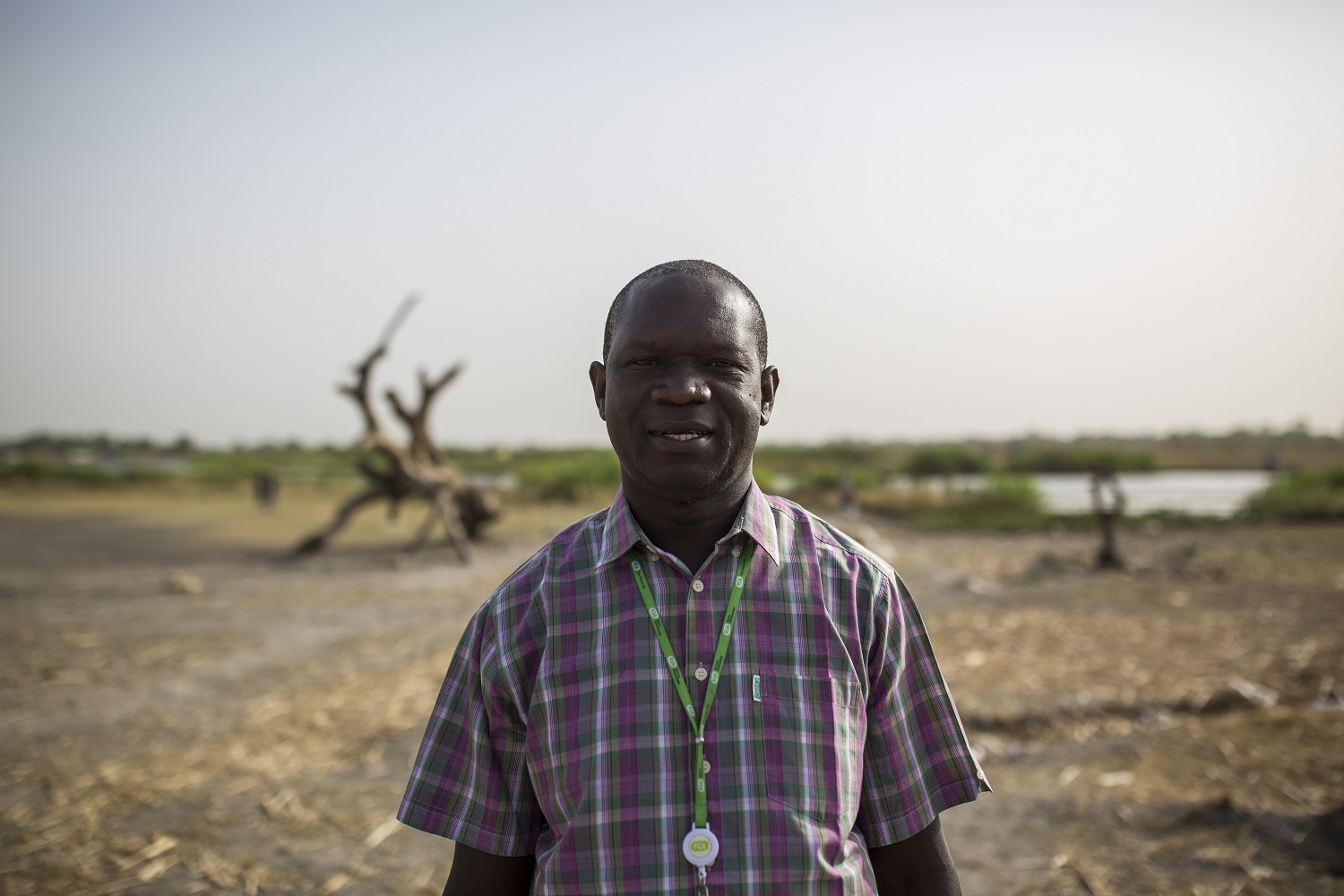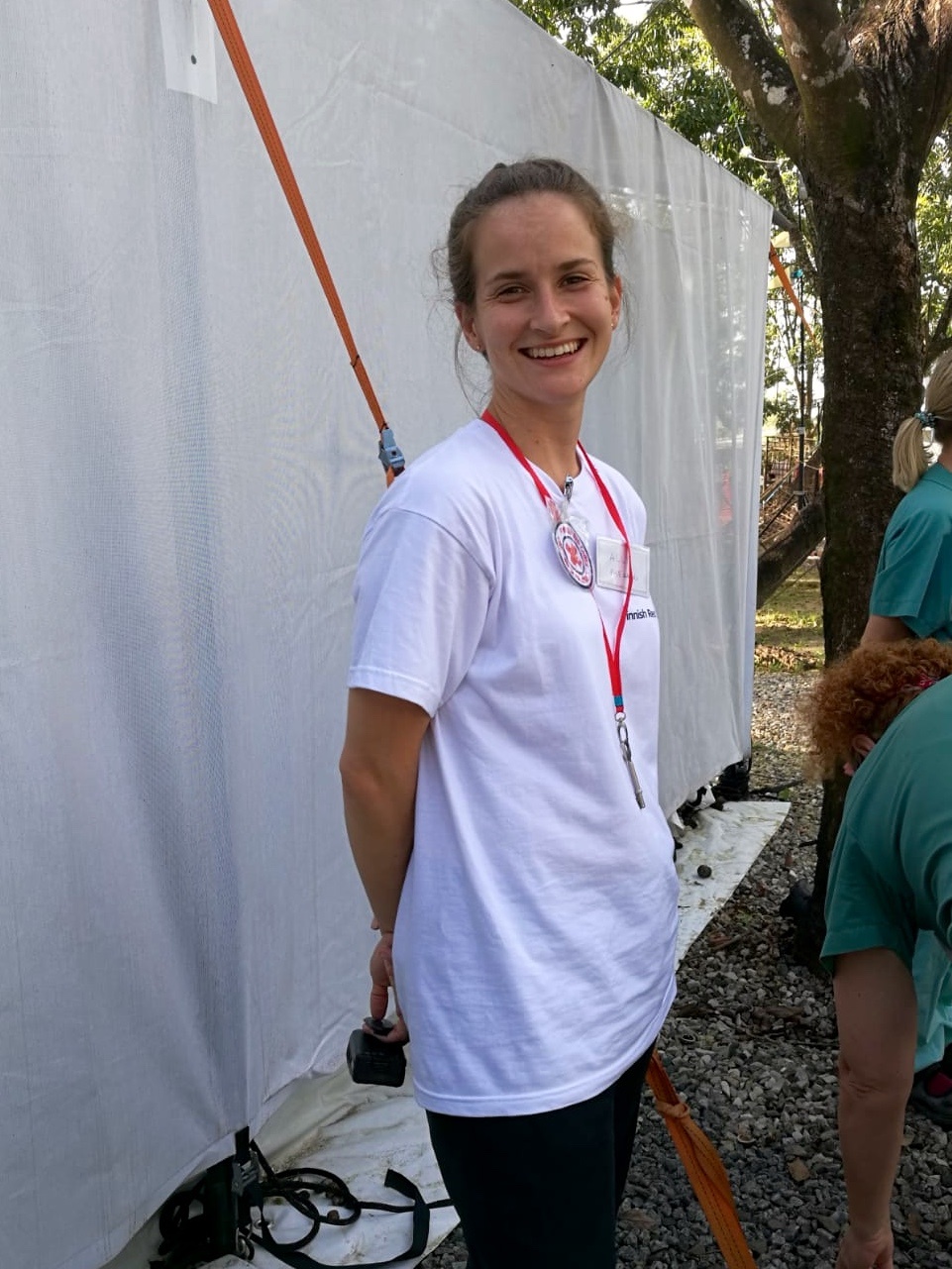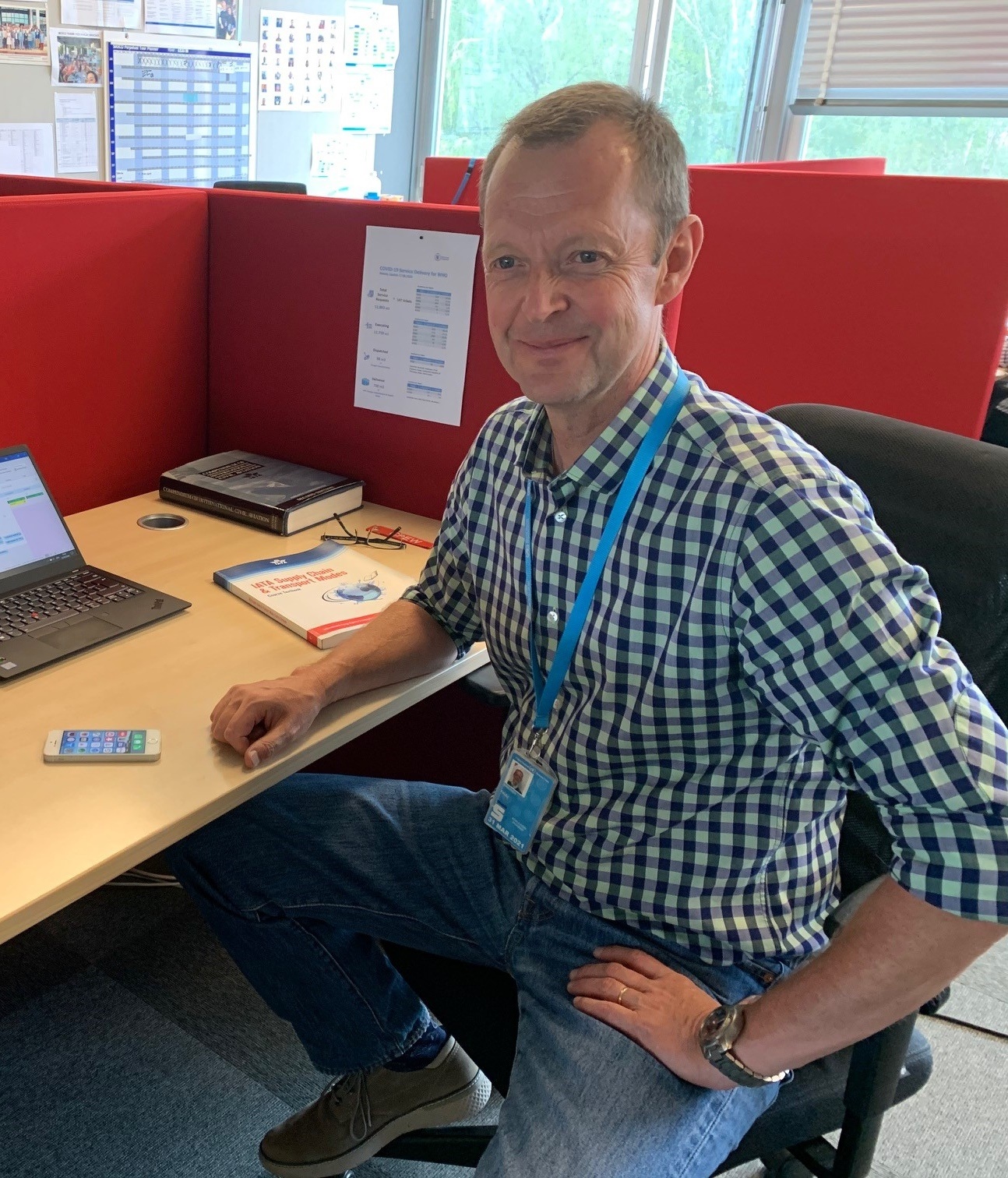“The most motivating thing is if you manage to make yourself unnecessary” – aid workers share what it’s like to work in the midst of a humanitarian crisis
On 19 August, we celebrate World Humanitarian Day. Aid workers from three organisations supported by Finland tell us what motivates them and how well humanitarian assistance reaches its destination.
Moses Habib Soro
Works as Humanitarian Coordinator for Finn Church Aid in South Sudan.

“I have been managing humanitarian assistance projects for the past eight years. My work has focused primarily on providing education in conflict zones and on improving food security and opportunities to earn a livelihood for people suffering from humanitarian crises.
I have been working with Finn Church Aid since 2014. For the past three years, I have served as Humanitarian Coordinator in South Sudan. I myself am South Sudanese, and I live in Juba, the country’s capital. My wife and four sons live in Uganda, where I go to visit them every three months. Now, however, I have not seen my family since January, because cross-border traffic is restricted due to the COVID-19 pandemic.
I work in close cooperation with the other units in our office, dealing with procurements, financing and budgeting, for example. I also pay regular visits to our seven field offices. I support the team leaders at the field offices in implementing projects, such as through monitoring and reporting. My job description also includes supporting the project assessment team. I participate regularly in national and regional forums and coordinate with Unicef, the South Sudan Humanitarian Fund (SSHF) and other donors that have offices in South Sudan.
I am motivated by learning new things and coming up with practical ideas for how to improve something. For the past four months, I have been trying to find new, practical ways to implement activities amidst the ongoing COVID-19 pandemic. For example, we recently completed the distribution of packages with agricultural tools and seeds to more than 1,500 households while maintaining safe distances. We made sure that our staff had facemasks and that handwashing facilities were available.
In areas facing humanitarian crises, the context is always evolving. This requires critical thinking, effective communication and flexibility in decision-making. I have learnt that understanding the facts about a crisis is key, especially the details and future ramifications.
My recent experiences with protracted displacement crises have shown me that the socioeconomic impact of internal displacement on host communities is oftentimes overlooked. As a result, there is growing prevalence of host families suffering economic strain from sharing their already inadequate resources with new families. Humanitarian assistance programmes tend to focus more on addressing the needs of displaced populations. My thinking and experience over the years is that it is possible to assist both internally displaced populations and host communities, which helps to eliminate the pressure on community resources and minimise competition or tensions in sharing resources.
The global humanitarian situation has deteriorated over the years. For example, crises due to armed conflict have increased and become more prolonged. Humanitarian crises have significant, long-lasting impact on socio-economic development, compromising people’s safety and security and their access to livelihoods and education. In many cases, the most vulnerable populations bear of the brunt of their negative impacts on physical health, mental wellbeing and the environment.
Peace is the greatest gift that humanity can ask for. I hope that Finns appreciate the fact that they have been able to enjoy peace for more than a hundred years now. In some places, even one year of peace is a dream.”
Alli Miikkulainen
Worked as a health delegate for the Red Cross in Lebanon, Bangladesh, Syria and South Sudan for stays of one to twelve months.

I don’t think the majority of humanitarian workers see their choice as a sacrifice. On the contrary, the work is interesting and gives a lot back to the people who do it", Alli Miikkulainen says.
“I am a public health nurse by training and hold a Master’s degree in health sciences. My duties as a health delegate have varied from supporting local primary healthcare to analysing patient data at a field hospital. All of my roles have in some way been related to public health, either locally or at a wider population level.
In South Sudan, we usually spent a week at each of the local health centres supported by the Red Cross, during which we supported the staff at the centre and met with local authorities as needed. My team included a South Sudanese midwife and nurse, and usually all of us on the team had our own goals for the field trips in relation to our areas of expertise.
On a typical day, for example, we might organise training for the traditional birth attendants in the community, discuss the challenges of the health centre with the village elders and spend time with the health centre staff, supporting them in patient work or working together to improve the functioning of the dispensary or waste management system. These clinics do not have electricity or many skilled workers, but they are of great importance to their communities. We stayed in the areas near the health centres in tents.
During my stays at field hospitals, I have been working with patient information systems. My tasks have included system planning, collecting data from different departments of the hospital, analysing data and producing data for planning and reporting purposes. These tasks mostly involve work on a computer somewhere near the hospital.
My work has varied considerably depending on the role and the context, but in all cases, cooperation with other delegates and local workers has been very important. Everyone has to be prepared to work beyond their own tasks as necessary and according to their skills. On short assignments, we work from morning to night and do not always have time for days off, while on longer assignments I try to keep more manageable working hours.
Encounters in the field constantly remind us of how similar people are in the end, no matter where you go – it’s just that the starting points are different, more favourable to some than to others. Natural disasters, epidemics and wars also show you that a disaster can affect anyone. From this point of view, solidarity feels natural and inevitable. Humanitarian work does not solve wars or other problems, but it can provide significant assistance at the individual and community levels. Moreover, not all humanitarian work is automatically useful, which is why it is essential to assess the situation carefully and listen closely to the target population.
Another thing that motivates me in my work is the data. The benefits of public health work are particularly visible in the long term, for example in mortality and morbidity rates, but even in the short term you can see changes in things like vaccination coverage or the number of clients at maternity clinics. For example, on my previous assignment in South Sudan, we helped the local health centre raise awareness of the benefits of family planning in the community. We could see the benefits of our work as the number of family planning visits at the health centre increased.
But perhaps the most motivating thing of all is if you manage to make yourself unnecessary. As a rule, humanitarian work is meant to be temporary, and in all operations our objective is always to support the local service provider or the Red Cross or Crescent so it can ultimately operate without external assistance.
I hope that the COVID-19 pandemic will remind people that similar, more local challenges exist all over the world, even if they are not considered newsworthy in Finland. People can also try to imagine the effects of the pandemic in a place like Yemen, which has already suffered from war, famine and a cholera epidemic.”
Pauli Immonen
Works for the WFP as an aviation consultant in the WFP and WHO’s joint unit, which coordinates transport needs related to COVID-19. a.

“When the COVID-19 crisis began, air traffic ground to a halt and about one third of the world’s cargo stopped moving. Finland and other EU countries had problems getting enough masks and other protective equipment, even though they have money, power and airlines.
Then imagine, what a challenge it would be for people in less developed or conflict-affected corners of the world. With this need in mind, the UN set up a WFP and WHO joint unit to coordinate transport needs for the emergency situation caused by COVID-19. The demands posed by COVID-19 are greater than those caused by any other humanitarian crises to date. The unit's work will continue for one month at a time, depending on the development of the pandemic and the increase in the capacity of commercial air traffic.
Of all the UN organisations, the WFP has the best professional skills in logistics. The idea behind our work is to get goods moving around the world; in simpler terms, our unit is responsible for getting the mask from a Chinese factory to the face of a person in Africa. There are a lot of planes and lorries in between. The current situation is unique in that we usually only make deliveries to one country or region at a time. Now they’re going to 138 different countries – it’s like putting out a fire in an apartment building, but there are fire pockets all over.
I do expert work from our office in Geneva. I am a pilot by training, so I am familiar with the different types of aircraft and I can tell you which route to take and what size packages the cargo should be packed in order to optimize the space in the cargo hold. If the cargo is going for example to Namibia, it may be more sensible to fly to South Africa and take the delivery from there by lorry, because flying is the most expensive mode of transport. When planning routes, the airlines must take into account e.g. quarantine requirements.
Sometimes we are faced with difficult ethical challenges. What if only some of the cargo has arrived to the airport? Do you wait until you can fill the aircraft, even though people may then became ill in the meantime due to the delay? Or do you fly with a smaller load, which is more expensive? Luckily I don't have to make these decisions as we work in a team and this in strong coordination with our main customers WHO, UNICEF and the NGO:s.
My values are strongly based on humanistic traditions and humanitarian values, and if my work means I can maybe help our planet to move ”a littlebit more in the right direction” that makes me happy. The reward of my work comes from the fact that I feel useful. I have nothing against holiday flights, but taking people home from a Christmas party is not the same thing as driving an ambulance.
I have previously worked on the ground in humanitarian organizations, and in 2005, I visited a huge refugee camp called Kalma near Nyala in Darfur. The absolute poverty, hunger and thirst I saw there was a shock. Development assistance – which looks to us like a boring line in the yellow budget book – means food and water in those circumstances, the difference between life and death.

People often ask me the same question: Does the assistance make it to its destination? Yes. Does it all get there? No. That said, some of Finland’s school food goes to pigs and sometimes Kela’s student financial aid falls into the wrong hands, too.
Aid organisations make enormous efforts to reduce losses. In WFP, we have robust monitoring systems that ensure that food and other services are going to those people, it is intended for. And colleagues throughout the organization are constantly working to improve workstreams thereby reducing losses. But we have to accept that loss is part of all human activity. The fact that irregularities sometimes occur does not mean we should question the validity of the whole operation or institution.
In the current world situation, we are seeing something new. COVID-19, humanitarian crises, the economic crisis and the climate crisis will be with us for a long time to come. The solutions to these crises will not come from Finland or the EU alone, but rather through global cooperation. The UN was born in the wake of the Second World War, when we needed a global actor to rebuild the world. Now, to deal with our current challenges, we need it more than ever.”
